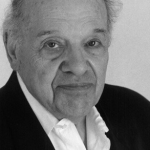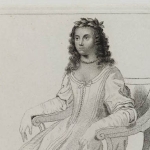After fighting with his dead brothers and his dead sisters
he chose to paint the dead rooster of his youth,
thinking god wouldn’t mind a rooster, would he?—or thinking
a rooster would look good in a green armchair
with flecks of blood on his breast and thighs, his wings
resting a little, their delicate bones exposed, a
few of the plumes in blue against the yellow
naked body, all of those feathers plucked
as if by a learned butcher, and yet the head
hanging down, the comb disgraced, the mouth
open as if for screaming, the right front chair leg,
seen from a certain angle, either a weapon
or a strong right arm, a screaming arm, the arm
of an agitator; and yet at the same time the chair
as debonair as any, the brown mahogany
polished, the carving nineteenth century, the velvet
green, an old velour, as if to match
the plumes a little, a blue with a green. No rabbi
was present, this he knew, and no dead butcher
had ever been there with his burnished knife
and his bucket of sand; this was the angry rooster
that strutted from one small house to another, that scratched
among the rhubarb, he is the one who stopped
as if he were thinking, he is upside down now
and plucked. It looks as if his eye can hardly
contain that much of sorrow, as if it wanted
to disappear, and it looks as if his legs
were almost helpless, and though his body was huge
compared to the armchair, it was only more
horrible that way, and though his wings were lifted
it wasn’t for soaring, it was more for bedragglement
and degradation. Whatever else there was
of memory there had to be revenge in there,
even revenge on himself, for he had to be
the rooster, though that was easy, he was the armchair
too, and he was the butcher, it was a way
to understand, there couldn’t be another, he had to
paint like that, he has to scrape the skin
and put the blotches on, and though it was
grotesque to put a dead rooster in an armchair
his table could have been full, or he just liked
the arrangement, or he was good at painting a chair
and it was done first—although I doubt it—or someone
brought him the bird—a kind of gift—for food was
cheap then, and roosters were easy to cook; but it was
more than anything else a kind of Tartar,
a kind of Jew, he was painting, something
that moved from Asia to Europe, something furious,
ill and dreamy, something that stood in the mud
beside a large wooden building and stared at a cloud,
it was so deep in thought, and it had tears
in a way, there was no getting around that kind
of thinking even if he stood in the middle of the room
holding his paintbrush like a thumb at arm’s length
closing one of his eyes he still was standing
in the mud shrieking, he still was dying for corn,
he still was golden underneath his feathers
with freckles of blood, for he was a ripped-open Jew,
and organs all on show, the gizzard, the liver,
for he was a bleeding Tartar, and he was a Frenchman
dying on the way to paris and he was
tethered to a table, he was slaughtered.


















Comment form: